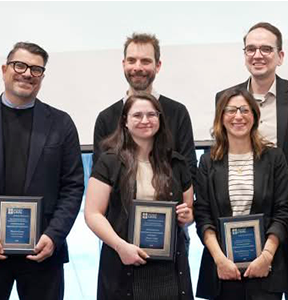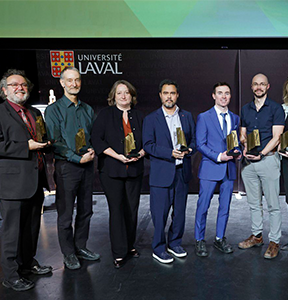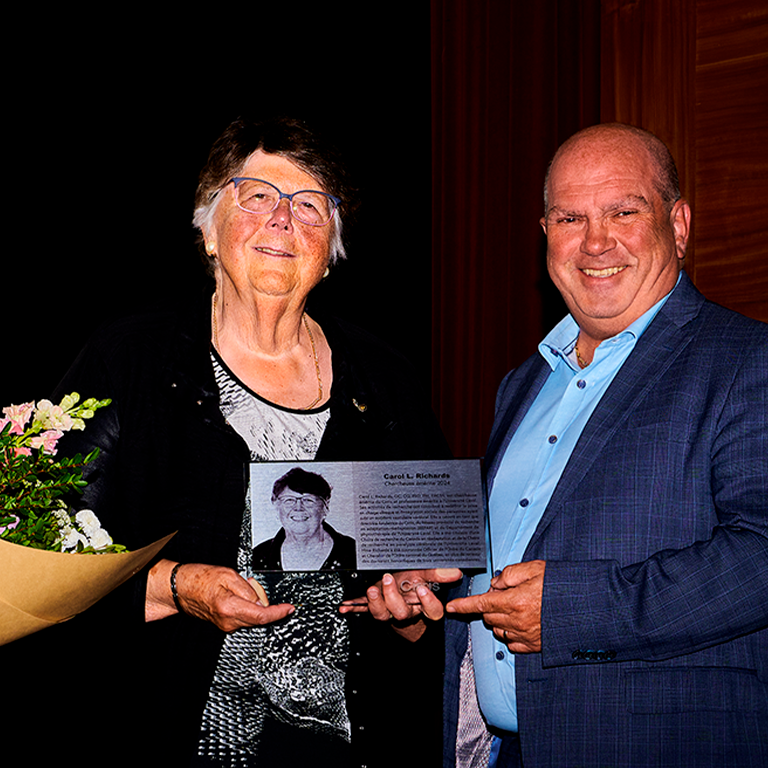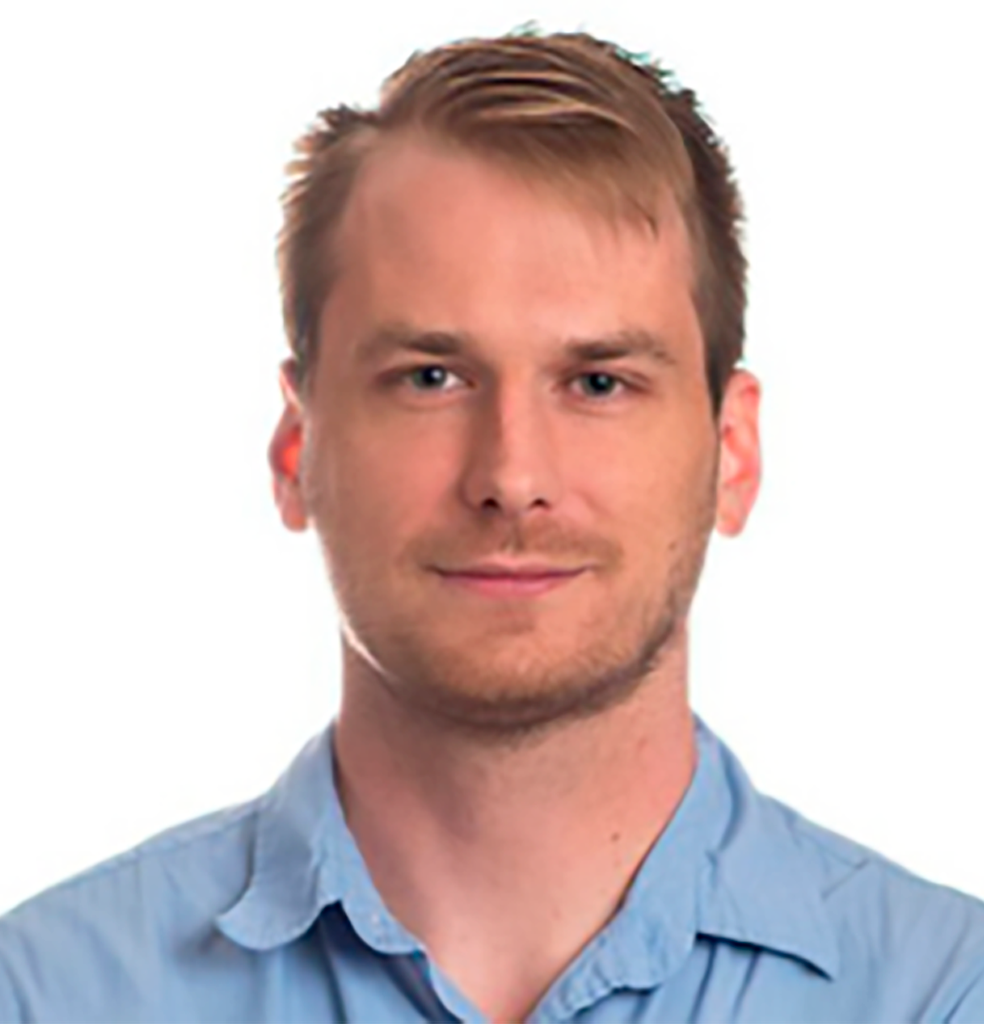
Teaching Excellence Award for Simon Beaulieu-Bonneau
Congratulations to Simon Beaulieu-Bonneau, Associate Professor at Université Laval’s School of Psychology, who has been awarded the Prix d’excellence en enseignement in the Associate or Full Professor category for 2023-2024! These awards recognize outstanding research and teaching by faculty members.
Simon Beaulieu-Bonneau is a Cirris researcher and FRQ-S Scholar (Junior 1). A psychologist by training, he holds an attestation for the evaluation of neuropsychological disorders, and his research interests focus on evaluation and intervention in rehabilitation neuropsychology, more specifically with adult clients who have suffered a traumatic brain injury or stroke. He is particularly interested in the functional impacts of cognitive disorders, the links between sleep and cognition, and the use of technology in neuropsychological assessment and intervention.
Photo credits: Faculty of Social Sciences, Université Laval

Teaching excellence award for 3 Cirris researchers
On December 4, Université Laval announced the names of its faculty members who have won a Teaching Excellence Award for 2024. Congratulations to the 3 Cirris researchers who are among the winners!
Alexandre Campeau-Lecours, full professor
Faculty of Science and Engineering, Department of Mechanical Engineering
Distance, Hybrid or Co-modal Course Award
François Routhier, full professor
Faculty of Medicine, School of Rehabilitation Sciences
Graduate Supervision Award
François Bergeron, full professor
Faculty of Medicine, School of Rehabilitation Sciences
Program Management Award
These awards recognize the exceptional contribution of professors who brilliantly pass on their passion and knowledge, and contribute to the reputation of Université Laval. It also highlights the excellence of their teaching practices, as well as their commitment, creativity and sense of innovation, and the quality of the teams that support them in their teaching approach.
To learn more, read the Université Laval article (in French) or watch the videos produced by Université Laval on each of the award winners:
Alexandre Campeau-Lecours
François Routhier
François Bergeron
Source :
Direction of communications
Université Laval
418 656-3355
medias@ulaval.ca

Aurélien Ramos wins two prizes at the Science POP 2024 provincial finals
Congratulations to Aurélien Ramos, a Master’s student in Rehabilitation Sciences, who took 1st place – Chief Scientist Award – in the Sustainable Health Challenge at the Science POP 2024 Grand Finals held on November 21 and 22 in Montreal ! His presentation entitled “Changer de réalité : une nouvelle vision de l’activité physique” (Changing reality: a new vision of physical activity) also earned him the People’s Choice Award!
Initiated by the Institut de Recherche Clinique de Montréal (IRCM), Science POP is a pan-Quebec competition offering 3 scientific communication challenges designed to promote science-society dialogue: Outreach Challenge, Media Challenge and Sustainable Health Challenge. Twenty-four finalists from twelve Quebec institutions took part in this grand final.
Congratulations also to Margaux Hebinck, a doctoral student in rehabilitation sciences, who defended her place in the Outreach Challenge with a presentation entitled “Fundamental motor skills: the anti-kryptonite of physical activity”.
Aurélien and Margaux are both affiliated with the Clinical Neurodevelopment Laboratory.
Photo credits: Clinical Neurodevelopment Laboratory

Carol L. Richards named Emeritus Researcher at Cirris
On June 17, the Cirris community paid tribute to its founder, Carol L. Richards. The ceremony was attended by many members of our research community, as well as various players in the healthcare sector. For the occasion, Ms. Richards was awarded the title of Cirris’ first Emeritus Researcher.
Throughout her exceptional career, Ms. Richards has shown great determination to advance rehabilitation research. Her sustained involvement led to the creation of Cirris, which is now recognized nationally and internationally as a leader in the field, and which today brings together 90 research teams.
Guy Thibodeau, President and CEO of CIUSSS de la Capitale-Nationale, was on hand to pay tribute to Mrs. Richards and present her with a plaque commemorating this achievement.
Congratulations, Ms. Richards!

FRQNT STRATEGIA grant awarded to Cirris team
A Cirris team led by Benoit Gosselin, and also including researchers Véronique Flamand, François Routhier, Alexandre Campeau-Lecours and Édith Martin, was recently awarded a STRATÉGIA grant from the Fonds de recherche du Québec – Nature et technologies (FRQNT) worth a total of $1,125,000 over 3 years for their project “MAIN: Myo-prothèse à Apprentissage Interactif et Neuro-renforcement”.
The STRATÉGIA initiative is part of the SQRI2 2022-2027 and the FRQNT Strategic Plan 2022-2025. Its main aim is to drive sustainable innovation in key economic sectors, by increasing research capacity tenfold, supporting the next generation of researchers, and generating significant spin-offs for Quebec.
About the project
Myoelectric hand prostheses enable people with upper-limb amputations to regain their abilities and independence in everyday life. However, the products currently on the market are very expensive, often uncomfortable, and still counter-intuitive, which greatly limits their positive impact.
The MAIN project aims to design the first intelligent hand prosthesis technology based on HD-EMG myoelectric sensors exploiting interactive deep learning. In addition to enhancing the user experience by compensating for their disabilities in a natural way, interactive learning combined with an on-board HD-EMG sensor platform will enhance users’ neuromuscular capabilities and fully exploit the capacities of their residual limbs, beyond current limits.
This project brings together international experts from five FRQ-NT strategic clusters (UNIQUE, ReSMiQ, INTER, REPARTI, CQMF), an FRQ-S network and center (REPAR and Cirris), two college technology transfer centers (TOPMED and Groupe CTT), public and industrial partners (CIUSSS-CN and BIO6), and four university research chairs (two Canada Chairs and two Canada-CIFAR Chairs). The team brings together world-renowned complementary expertise in biomedical engineering, clinical rehabilitation, artificial intelligence (AI), robotics and materials science to create a new intelligent myoelectric prosthesis technology that will revolutionize current approaches and transform healthcare in Quebec and around the world.

Catherine Mercier awarded Canada Research Chair in Sensorimotor Rehabilitation and Pain
Catherine Mercier is Scientific Director of the Centre interdisciplinaire de recherche en réadaptation et intégration sociale (CIRRIS), Full Professor in the Department of Rehabilitation, Faculty of Medicine, Université Laval, and a member of the Québec Pain Research Network (QPRN). She was recently awarded a Tier 1 Canada Research Chair in Sensorimotor Rehabilitation and Pain. Tier 1 Chairs are awarded to outstanding researchers recognized by their peers as world leaders in their field. For each Tier 1 Chair, the institution receives $200,000 per year for seven years. The mission of this Chair is to develop a better understanding of the interactions between sensorimotor functions and pain, focusing in particular on the changes that occur in the central nervous system in response to injury, disease or intervention, in order to maximize the effectiveness of rehabilitation interventions.
The Canada Research Chairs Program is at the heart of a national strategy to make Canada one of the best countries in the world for research and development. It invests approximately $311 million a year to attract and retain a diverse group of top-notch researchers, in order to consolidate excellence in research and training at Canada’s post-secondary institutions. This program is a joint initiative of the three research funding agencies: the Social Sciences and Humanities Research Council (SSHRC), the Natural Sciences and Engineering Research Council (NSERC) and the Canadian Institutes of Health Research (CIHR).
The entire Cirris community extends its most sincere congratulations to you, Pre Mercier!
Source: RQRD

Maxime Robert receives ISVR’s Early Career Investigator Award 2024
Congratulations to Maxime Robert, winner of the 2024 Early Career Investigator Award from the International Society for Virtual Rehabilitation (ISVR)! The award, which recognizes and honors outstanding leadership and dedication, will be officially presented to him at the organization’s next world congress, to be held in Amsterdam from June 26 to 28, 2024.
Each year, ISVR brings together interdisciplinary experts engaged in cutting-edge research, clinical advancement and entrepreneurial exploration, offering an in-depth presentation of new technologies and clinical developments in virtual reality (VR), extended reality (ER) and advances applied to rehabilitation.
Maxime Robert has been an assistant professor at Université Laval’s École des sciences de réadaptation since 2019 and a researcher at Cirris. His research program covers a broad spectrum and has enabled him to acquire and develop unique multidisciplinary expertise in motor control, learning and the development of intensive intervention with virtual reality for children with cerebral palsy.
Among the innovations in the field of virtual rehabilitation that earned him this prestigious award:
The clinical use of active video games for children with cerebral palsy:
Children with diplegic cerebral palsy exercise at a similar intensity to typically developing children when playing on an active video game console. This was demonstrated by Professor Robert in a study cited more than 60 times by the scientific community, proving that active video games can promote physical fitness in children with cerebral palsy.
Motor learning, the role of sensation and the use of virtual reality in children with cerebral palsy:
Professor Robert and his team have demonstrated that after intensive functional intervention using a virtual reality system, motor improvements can not only be retained, but also transferred to a similar task. The functional task adapted to the study is now being used in other laboratories, notably in studies on adult stroke victims.
A clinical site for intensive interventions with children suffering from cerebral palsy:
In partnership with clinicians at CHU Sainte-Justine’s Centre de réadaptation Marie Enfant, Pr Robert and his team have set up a summer training camp for children with cerebral palsy. This 2-week, 60-hour intensive therapy integrates virtual reality into an intensive reference intervention, offering a range of exercises not usually performed in a clinical setting. The clinical trial began in summer 2022 and is due to be repeated over the next five years. Around 60 children will benefit.
Virtual reality in the service of adapted physical activity for people with neurological disorders
A virtual platform can be a valuable tool for clinicians wishing to offer stimulating and motivating physical rehabilitation activities to people with physical disabilities, in a variety of settings, including the home. In collaboration with technology and community partners, Professor Robert is developing innovative solutions to promote physical activity using virtual reality outside the clinical setting.
For more information: communications@cirris.ulaval.ca

Stéphanie Bernard, winner of the program to support young leaders and the next generation of sustainable healthcare professionals
On March 28, the Chaire de recherche en santé durable announced the results of the first competitions in its program to support young leaders in sustainable health.
Among the winners: Stéphanie Bernard, assistant professor in the Department of Rehabilitation at Université Laval and researcher at Cirris. She was awarded a $40,000 grant for her project entitled “Perineal and pelvic health needs of LGBTQIA2S+ people: understanding them better to respond more effectively”.
Through this program, the Chair aims to support intersectoral projects co-constructed with citizens and communities that can contribute to the production of knowledge relevant to the various dimensions of sustainable health.
Twenty-three eligible applications from a variety of disciplines were assessed by independent evaluation committees made up of members of the scientific community and citizens. At the end of this process, 9 scholarships and 4 grants, totalling $349,500, will be awarded to outstanding candidates.
Congratulations, Pre Bernard!
Source: Sustainable Health Research Chair
Photo credits: Martin Roy, Communications Department, Université Laval

Mir Abolfazl Mostafavi awarded Canada Research Chair in Intelligent and Inclusive Cities and Mobilities
Mir-Abolfazl Mostafavi is a researcher at Cirris, a full professor in the Department of Geomatics at Université Laval and a member of the Centre de recherche en données et intelligence géospatiales (CRDIG). He was recently awarded the Canada Research Chair in Intelligent and Inclusive Cities and Mobilities (Level 1), whose objective is to characterize the barriers that exist in the city and in buildings, to understand the interactions between people with disabilities and their environment, and to develop tools and methods for building more intelligent and inclusive cities. The Chair’s activities began in May 2023.
In Canada, 27% of the population aged 15 and over claim to live with a perceptual, cognitive or motor disability. For these people, there are many disabling situations, particularly when it comes to getting around town to take part in the various activities of daily life. In order to develop mobility solutions and environments adapted to all, innovations from the geomatic sciences can be put to good use.
The award of these chairs is both a recognition of the quality of the work carried out by the researchers, and a guarantee of recurring financial support for several years.
The entire Cirris community offers its most sincere congratulations!
To find out more about the research activities of Prof. Mostafavi’s team, watch this short video (in French):
When technology makes cities more accessible – Université Laval at the heart of our lives

Congratulations to the recipients of the OOAQ-REPAR research partnership scholarships!
The research partnership program between the Ordre des orthophonistes et audiologistes du Québec (OOAQ) and the Réseau provincial de recherche en adaptation-réadaptation (REPAR) of the Fonds de recherche du Québec-Santé (FRQ-S) encourages research projects in speech-language pathology and audiology aimed at improving clinical practice and the quality of services to the population in the field of communication disorders. In 2023, this partnership made it possible to award two grants worth $15,000 each.
The winning projects are :
- Myriam Breton and Vincent Martel-Sauvageau, speech-language pathologists, for their project État des besoins orthophoniques et de la prise en charge des personnes atteintes de la COVID longue au Québec : vers l’établissement de recommandations provines adaptées aux besoins orthophoniques de cette clientèle. (State of speech-language pathology needs and management of people with long-onset COVID in Quebec: towards the establishment of provincial recommendations adapted to the speech-language pathology needs of this clientele.)
- Claudia Côté and Philippe Fournier, audiologists, for their Projet d’amélioration des outils d’évaluation clinique de l’hyperacousie et de la misophonie au Québec. (Project to improve clinical assessment tools for hyperacusis and misophonia in Quebec.)
Find out more about these two projects, we invite you to view a video produced in conjunction with the award ceremony, featuring a discussion with Paul-André Gallant, President of the OOAQ.
Source: OOAQ

In the photo:
Bottom row: Phillipe Fournier (Cirris researcher and professor in the Audiology Program at Université Laval, project co-leader, audiologist), Claudia Côté (audiologist, project co-leader). Top row: Samuel Montminy (audiologist, Catherine-Ève Morency (audiologist), David Ratelle (audiologist), Véronique Rivest (audiologist), Anaîs Gros-Louis (audiologist), Richard Larocque (audiologist and interim program leader).

Chantal Desmarais and Véronique Caron receive the OOAQ’s Innovation sociale-Desjardins 2023 award
The Ordre des orthophonistes et audiologistes du Québec (OOAQ) awarded this year’s Prix Innovation sociale-Desjardins to speech therapists Chantal Desmarais and Véronique Caron for their ESCALADE intervention program, aimed at supporting adolescents with developmental language disorders (DLD). Under the responsibility of Cirris researcher Pre Desmarais, the Université Laval research team and its partners in the education and health and social services networks designed the program in response to a critical lack of resources in the field. The ESCALADE program helps teenagers with LD to gain self-awareness and master strategies to develop better communication skills.
The ESCALADE program is designed to meet the needs of two main groups: junior high school students with developmental language disorders (DLD), for whom few services are currently available, and school practitioners who welcome and accompany these young people, and who report a lack of tools to support them in their progress towards better communication skills.
The program includes 17 turnkey activities for use in the classroom, and 5 main tools: a facilitator’s guide, a student workbook, support and training videos for facilitators, posters featuring the program’s key visuals, and PDFs of the training capsules. All this material can be viewed and downloaded free of charge here.
Congratulations to the whole team!

Alexandra Lecours wins the Prix de la Francophonie for young researchers, 2023 edition – Humanities and Social Sciences section
On November 1, as part of the Semaine mondiale de la Francophonie scientifique (SMFS) in Quebec City, the Prix de la Francophonie for Young Researchers, 2023 edition, was awarded. Alexandra Lecours, a researcher at the Centre interdisciplinaire de recherche en réadaptation et intégration sociale (Cirris), was awarded a prize in the Humanities and Social Sciences category.
The Prix de la Francophonie for young researchers are awarded by the Scientific Council of the Agence Universitaire de la Francophonie (AUF) to recognize the merit and worth of researchers under the age of 40 who have achieved scientific recognition and made a significant breakthrough within the Francophonie. They take into account the diversity of the French-speaking academic world, particularly that of developing countries. The prizes are awarded every two years and cover two disciplinary fields: Science and Technology, and Humanities and Social Sciences.
Alexandra Lecours is a professor in the Department of Occupational Therapy at the Université du Québec à Trois-Rivières (UQTR), a regular researcher at Cirris and holder of the UQTR (jr) Research Chair on the health of aging workers. Her research projects aim to promote equity, diversity and inclusion in the workplace, in order to foster the healthy participation of aging people in the workplace.
A proud French-speaking researcher, she collaborates with researchers from the scientific Francophonie in several countries of the Americas, Europe and Africa, so that her projects respond to the different cultural realities of aging workers. Our projects aim to develop theoretical and practical knowledge that can be used internationally, particularly in the French-speaking world.
She also makes a point of supporting graduate students from various French-speaking countries. As a first-generation university student herself, she attaches particular importance to equality of opportunity and diversity of backgrounds in her research team. Equity, diversity and inclusion are values that guide both the conduct of her research projects and the management of her team.
She holds leadership roles in occupational health research at provincial, national and international levels. In particular, she is responsible for the Cirris Environment Axis, and co-leads the Prevention, Screening, Evaluation and Innovative Intervention Axis of the Réseau provincial de recherche en adaptation-réadaptation. She is also associate editor of the Canadian Journal of Occupational Therapy. She also organized an international symposium on the health of aging workers in 2022, which brought together researchers, students and partners from across the French-speaking world.
The importance of the French language in her career is evident, and has led to prestigious awards, including the Prix Publication scientifique en français Louise-Dandurand from the Fonds de recherche du Québec – Société et Culture in 2022. To date, she has received over $3.5 million in research funding, published 72 papers and given some 100 lectures around the world.
The entire Cirris community offers her its most sincere congratulations!
